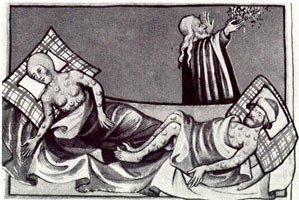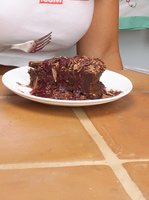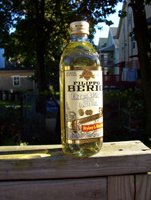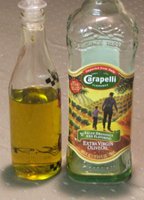
TOPIC: How Important Is Dietary Fat To A Bodybuilder?

The Question:
It's so obvious how important proteins and carbohydrates are to a bodybuilder, and it has become easy for one to understand how they should control their consumption of them. However, fats seem to be often overlooked in a bodybuilder's nutrition plan.
How important is dietary fat to a bodybuilder?
Which fats are most beneficial? Which foods provide these?
Which fats should one avoid? Which foods contain these?
Bonus Question: Does it matter what time of day these healthy fats are taken? If so, what is the best time?
Show off your knowledge to the world!
The Winners:
- 1. soundcheck129
- 2. vanhalen984
- 3. wannabstrong
- 3. History in Effect
Prizes:
- 1st place - 75 in store credit.
- 2nd place - 50 in store credit.
- 3rd place - 25 in store credit.

1st Place - soundcheck129
View This Author's BodySpace Here.


The Skinny On Fat
It's so obvious how important proteins and carbohydrates are to a bodybuilder, and it has become easy for one to understand how they should control their consumption of them. However, fats seem to be often overlooked in a bodybuilder's nutrition plan.

How Important Is Dietary Fat To A Bodybuilder?
In a word, dietary fat is essential. Despite what the media or Joe Cubicle might tell you, fat is your friend, no matter who you are. I like to think of nutrition as a three-legged stool. Each leg of the stool represents one of the basic macronutrients - protein, carbohydrates and fats.
If your diet is deficient in any one of these, that "leg" will be too short and your stool will topple over. However, consuming sufficient amounts of each will ensure that your diet is balanced and you'll be sitting pretty.
So why is fat important? I'll begin with the obvious.
Fat is caloric dense. Packing nine calories per gram, fat is a more concentrated source of energy than both protein and carbohydrates. In order to gain mass, as many bodybuilders are attempting to do, you need to be in a caloric surplus.
Because dietary fat provides so many calories in such a small volume of food, it is a lifesaver for many "hardgainers" who would otherwise have no way of consuming enough calories by the end of the day. Let me put it this way - would you rather chow down on a forest of broccoli or a tablespoon or two of peanut butter to grow?
In addition, fat is used in many places throughout the body. It's common knowledge that cells are the building blocks of the human body, but did you know that cell membranes are composed of fat? Without properly functioning cell membranes, there would be no way to regulate which substances could or could not enter cells - a definite problem.
Fat is also a great insulator, helping the body maintain a healthy temperature and keeping you warm. Similarly, fat also provides cushioning, protecting vital organs from damage.
And speaking of vital organs, your brain wouldn't be the same without fat, as fatty acids from the food you consume form some of the working surface of your brain. These fatty acids also make up the myelin coating on neurons that your nervous system uses to communicate. Intake of fat has also been shown to be correlated with lower rates of depression.1
And you've probably heard of the term "fat-soluble." This refers to nutrients that cannot be absorbed by the body unless in the presence of fat. Some of these nutrients are vitamin A, vitamin D, vitamin E and vitamin K.
Ever wonder why many labels for supplements and vitamins include instructions that the product is to be taken with a meal? That's to ensure there is fat to carry fat-soluble nutrients to your body.
Fat also provides a great service by keeping hormone levels in check and regulate blood-glucose levels and insulin response.
Last, but certainly not least... fat is DELICIOUS!! Fat is a great source of succulent flavor. Think about it - to appeal to people, foods are often described as creamy, buttery, and rich, not grainy, starchy and doughy.

 Click To Enlarge.
Click To Enlarge. Foods Are Advertised As Creamy, Buttery,
And Rich, Not Grainy, Starchy And Doughy.
No coincidence there. And if you don't think this counts as "important," consider a pre-contest dieting bodybuilder. With a diet full of leafy greens and lean meats, some nice, flavorful fat might be the only thing keeping one sane. And that's definitely important.

Which Fats Are Most Beneficial?
Part of the fiction surrounding fat is due to the fact that there are several different kinds of dietary fats. Not unlike the "good carbs" and "bad carbs," the types of fats have been divided into two categories - friendly fats and fat foes. So which kinds should you eat?

Omega-3 Is A Magic Number
- A lot of buzz has been created recently about Omega-3 fatty acids, and it's not difficult to see why. The Omega-3s contain DHA and EPA, which lower bad cholesterol and lower blood pressure.
2
- . You can also obtain these via
- .

Monounsaturated Fats
- Another one of the good fat sources are the monounsaturated fats. These are generally considered the best as they do not have many adverse affects associated with them. Also, monounsaturated fats have been linked to lower
- , reductions in
- , and
- .
3

Polyunsaturated Fats
- Like the monos, polyunsaturated fats are associated with raising good cholesterol and lowering bad cholesterol. These fats are usually liquid at room temperature and in the refrigerator, and good sources include corn, sunflower and soybean oils.

Saturated Fats
- No, I'm not confused, and I'm not insane either. While saturated fats have long been demonized by the health community, these fats DO have advantages, many of them of particular interest to bodybuilders.
Primarily, saturated fats aid in the incorporation of calcium into the skeletal system, helping you build strong bones. And if you're constantly pushing your body to the limits in the weight room, you'll want a strong frame. In addition, saturated fats boost immune system health, keeping you in fighting shape.
- Saturated fat also aid in the utilization of essential fatty acids and protect the liver from toxins such as alcohol.
4
Maybe most importantly, saturated fat has been linked to testosterone production - and I don't have to tell you how important that is to growth.

Which Fats Should One Avoid?
While I am without a doubt a big fan of fats (about 40 almonds were eaten during the creation of this piece), there is one type of fat I DO avoid - trans-fats. Unless you've been living under a rock, you've definitely heard of trans-fats, as manufacturers have begun stamping "0 Grams Trans-Fat" on product labels and the fats are even being banned in some cities.
 |
Did You Know? Denmark became the first country to introduce laws strictly regulating the sale of many foods containing trans fats in March 2003, a move which effectively bans partially hydrogenated oils. The limit is 2% of fats and oils destined for human consumption. It should be noted that this restriction is on the ingredients rather than the final products. This regulatory approach has made Denmark the only country in which it is possible to eat "far less" than 1 g of industrially produced trans fats on a daily basis, even with a diet including prepared foods. |
 |
 |
||
But what are they? Trans fats begin their lives as mono- or polyunsaturated fats, but they are altered when they go through a process called "partial hydrogenation".5 Unfortunately, the formerly good qualities of the original fats are reversed, and trans fats raise bad cholesterol, lower good cholesterol, raise your risk of stroke and heart disease, and even developing diabetes. These fats are to be avoided at all costs.
And while labels now do include trans fat indicators, it is important to know that manufacturers can legally mark a product as containing no trans-fat, even if it does contain some. The concentration just must not exceed .5 grams per serving. However, many products are often eaten in multiple "servings" at a time, so be careful. Any product that includes "partially hydrogenated" oils in the ingredient list DOES contain trans fat, despite what the label says.

Does It Matter What Time Of Day These Healthy Fats Are Taken?
In my book, any time is a good time for fat. Fats make a delicious addition to any meal, and complete meals tend to have lower glycemic indexes, keeping your blood glucose levels in check and prevented insulin spiking and subsequent fatigue. Fats also keep you feeling full, and are ideal for breakfast and in between meals.
And if you cut carbs at night, fats are a great way to keep the calories coming in. In addition, fat can slow gastric emptying, so if you have fats with a protein source before bed, the fat may slow down protein absorption, allowing you to have a steady stream of protein for growth and repair as you sleep.
However, fat intake should be watched carefully if you're on a restricted calorie diet. Because they are calorically dense, you can easily go above your maintenance calories by consuming too much fat and you may gain weight. Fat may have its benefits, but a calorie is still a calorie.
SOURCES:
- The Human Brain. The Franklin Institute: http://www.fi.edu/
- Omega-3 Fatty Acids. The Mayo Clinic: http://www.mayoclinic.com/
- Monounsaturated Fats. Anne Collins: http://www.annecollins.com/
- The Benefits of Saturated Fats. Share the Wealth: http://www.newmediaexplorer.org/
- Trans Fat: What Is It? Vanderbilt University: http://www.vanderbilt.edu/

2nd Place - vanhalen984

Often overlooked by many bodybuilders, dietary fat is an essential part of the diet. Although frequently condemned and looked down upon by the media and magazines, fat is not as bad as it is made out to be. In fact, it is good for you. Very good actually.
Dietary fat has many benefits such as lowering cholesterol and reducing the risk of heart disease. This does not mean to go out and eat fatty fast food, because not all fats are the same.

How Important Is Dietary Fat To A Bodybuilder?
A bodybuilder needs carbohydrates to fuel workouts, protein to pack on the muscle, but what are the fats for? Well, fat has many benefits to everyone, and a bodybuilder is no exception. Packing a whopping 9 calories per gram, it has more than twice as many calories as protein and carbohydrates, which each only have 4 calories per gram. This is obviously a nice benefit to anyone looking to add some muscle.
Let's not forget that dietary fat provides a myriad of health benefits which any bodybuilder to use. These include reducing the risk of heart disease, lowering cholesterol, promoting healthy skin, boosting the immune system, and they can possibly help protect against cancer.
A healthy bodybuilder will have more energy and will have an easier time gaining mass than one whose diet consists of cake and cookies.
Now that you know why fat is important, it's time to learn which fats to eat, and which to avoid... like the plague.

Which Fats Are Most Beneficial?

Monounsaturated Fats
- The United States has a much higher rate of heart disease compared to areas like the Mediterranean, which have very low rates. This is largely due to the high consumption of
olive oil
- , which is about 75% monounsaturated fat. It is clear that this fat is great for protecting against heart disease, but that's not all it can do.
| BODYBUILDING.COM FORUM: OLIVE OIL THREAD | |||
|
Started By: polishdude20 |
- Monounsaturated fats can also lower
- level, promote healthy skin, may protect against certain cancers, and helps maintain good general health.
Aside from olive oil, this fat can also be found in great quantities in grapeseed oil, hazelnuts, almonds, Brazil nuts, cashews, avocados, sesame seeds, and pumpkin seeds. Many oils contain high amounts of monounsaturated fat, and foods such as popcorn, whole grain wheat, oatmeal, and cereal also contain some.

Polyunsaturated Fats
- Another very healthy fat, polyunsaturated fat is very good for the body. It can also lower cholesterol, and it also reduces the risk of cardiovascular disease.
- Polyunsaturated fats contain
- , which the body cannot produce itself. These fatty acids have benefits of their own which will be discussed a little later.

Fish Oil
- Although not exactly a fat, I thought it should be included here because it contains
- , eicosapentaenoic acid (EPA), and docosahexaenoic acid (DHA), all which provide many benefits similar to those of the fats above. Many people turn to
- to get sufficient amounts of these three acids, and I recommend you do the same.
- Omega-3 fatty acids can reduce the risk of cancer, as well as reduce the chance of heart attack and regulate cholesterol. Fish Oil is also able to reduce the risk of
- , protect the
- from cognitive problems, and provide many, many, more benefits which we will not get into here.

Which Fats Should One Avoid?

Trans Fats
- Trans fats are the worst type of fat you can possibly eat. These man-made fats can harm the body in countless ways. They can raise cholesterol levels, increase the risk of heart disease, Alzheimer's disease, cancer,
- , liver dysfunction, and infertility.
- Be careful though - some foods, such as
peanut butter
- , may say 0g of trans fat on the label, but the ingredients contain hydrogenated oils. Hydrogenating oils creates trans fats, and it is not listed on the label because anything under 0.5g does not have to be listed.
I buy natural peanut butter to avoid consuming any trans fats at all, and I recommend you do the same.

Saturated Fats
- A little bit of saturated fat is good for you, but too much is bad and can raise
- , and increase the risk of
- , stroke, and cancer.
- The body can make its own saturated fat, so it really is not necessary to consume any in your diet, although this would be nearly impossible because most foods contain some saturated fat. You can offset its negative effects by consuming more polyunsaturated and monounsaturated fat than saturated fat, but it is much easier just to try to limit your saturated fat intake.

Does It Matter What Time Of Day These Healthy Fats Are Taken?
Although the time of day these fats are consumed is not as important as which fats you consume, it is still best to consume fats in the evening and before bed. This is because fats slow down the digestion of food thus providing your body with nutrients for a longer period of time during sleep.
It is best to eat just protein and carbohydrates for breakfast, and limit fats, because the body has just been fasting for about 8 hours, and you want to get some nutrients as soon as possible. The same applies for after a workout - you do not want to consume fats to after a workout and deprive your nutrient-hungry muscles of the protein and carbohydrates.

3rd Place - wannabstrong
View This Author's BodySpace Here.


The Facts On Fat 
Energy is stored as fat in our bodies, but some nutrients called essential fatty acids are not self-manufactured so foods containing dietary fat must be consumed. Dietary fat is important to bodybuilders because it helps keep the blood flowing, the heart beating correctly and keeps the skin and hair healthy. It also slows digestion and increases the feeling of fullness.
However, all fat is not created equal. It is very important to include the right types of dietary fat in our daily food intake since we need to balance the ratio of good fat to bad fat while consuming large quantities of food each day. The following article will explore what types of fat exist, where it is found and how it impacts our bodies.
There are 3 basic types of dietary fat: Unsaturated, Saturated, and Trans Fat.

Unsaturated Fat = The Good Fat
- The most beneficial dietary fat is unsaturated. High levels of unsaturated fats are found in vegetables like
nuts
- ,
seeds
- , and plant based oils. This fat can be broken down into two categories: monounsaturated fat and polyunsaturated fat.
High amounts of monounsaturated fat is found in olive oil and canola oil. High amounts of polyunsaturated fat is found in soybean oil, sunflower oil, and nuts. Unsaturated fat is also found in animal sources, but many times it comes with a price: saturated fat.

Limit Saturated Fat And Avoid Trans Fats
- You should remain aware, closely monitor, and severely limit saturated fat but not completely avoid it. If you are a non-vegan bodybuilder it is inevitable that you will have saturated fat in your diet as it is mostly found in animal sources like
beef
- ,
chicken
- ,
eggs and dairy products
- .
It is easy to forget that these protein rich foods contain saturated fat. If you are eating steak it is healthier to choose a leaner cut or if making hamburgers choose ground beef with a lesser percentage of fat. Another option is eating fish since it has lower saturated fat and high in omega-3 fatty acids (which are heart healthy).
- In recent years, there has been a major decline in the use of Trans fatty acids inside pre-packaged and fast-food. A process called "partial hydrogenation" - turned common vegetable oil into a solid at room temperature. This made pre-packaged
The downside is it has been linked to coronary heart disease, but the upside is that regulating agencies have taken notice and actions have been taken to label them on food items.

Saturated Fat And Trans Fat Influences Coronary Heart Disease
- The main problem with most foods containing saturated fat is that animal sources also contain
- . Cholesterol is not a fat, although they are both lipids. Cholesterol can be good (HDL) and bad (LDL).
- Saturated fat increases LDL-cholesterol levels, while unsaturated fat like olive oil has been shown to reduce LDL-cholesterol levels. High cholesterol and especially high LDL-levels are both contributing risk factors for heart disease. Trans fat also shows a very strong link to heart disease.
Please note that there are very small quantities of trans fat in animal meat and dairy products, so it would be nearly impossible to remove it from one's diet completely.

Have A Balanced Fat Intake
- Having a balanced consumption of the various fats is also important. According to the
University of Pennsylvania Health System
- , nearly a third of your daily
- can consist of
- . Our calories should consist of less than 10% each of saturated fat and polyunsaturated fat, while 10-15% of our calories should come from monounsaturated fat.

Is Consumption Time Of Dietary Fats Important?
As bodybuilders, nutrient timing is very important in our daily eating schedule. Due to fat's ability to slow digestion they should be avoided when nutrients are needed quickly such as post-workout and when you need a quick recharge such as the first meal of the day (when you have been fasting all night long). However the slower digestion can be taken advantage of before bed and other times during the day where it's satiating properties can be most beneficial.
Works Cited:
- FDA. Questions and Answers about Trans Fat Nutrition Labeling. http://www.foodsafety.gov/
- Mayfield, Eleanor. A Consumer's Guide to Fats. FDA. http://www.cfsan.fda.gov/
- Mayo Clinic. Dietary fats: Know which types to choose. http://www.mayoclinic.com/health/fat/NU00262
- UPHS. Nutrition Care Guide: Fat in Your Diet. http://www.pennhealth.com/

3rd Place - History in Effect
View This Author's BodySpace Here.

When people mention the word fat, it is like a dirty word many people cringe at hearing. Everybody in the media has cast off fat like a Survivor contestant on an island. The pure mention of fat has people cowering in fear and ducking into corners. Trans fat has become the most targeted fat for good reason. The FDA describes trans fat as this:
"Basically, trans fat is made when manufacturers add hydrogen to vegetable oil--a process called hydrogenation. Hydrogenation increases the shelf life and flavor stability of foods containing these fats." (Source: FDA from http://www.fda.gov/)
Trans fat has made a bad name for the other fats. Wait... History in Effect, you mean there are good fats? Yes, ladies and gentleman. I will explain in detail.
| BODYBUILDING.COM FORUM: FAT THREAD | |||
|
Started By: Django |

How Important Is Dietary Fat To A Bodybuilder?
Dietary fat is of vital importance to a bodybuilder. Your body needs these fats and converts them to energy. The Mayo Clinic is a great source for the benefits of fats and how they affect your body:
"Dietary fat carries fat-soluble vitamins - vitamin A, vitamin D, vitamin E and vitamin K - from your food into your body. Fat also helps maintain healthy hair and skin, protects vital organs, keeps your body insulated, and provides a sense of fullness after meals." (Source Mayo Clinic http://www.mayoclinic.com)
Fat also satisfies you and makes you feel full longer too.

Which Fats Are Most Beneficial?

Monounsaturated Fats
- "Monounsaturated fat remains liquid at room temperature but may start to solidify in the refrigerator"
(Source Mayo Clinic http://www.mayoclinic.com)
- . These fats are great for your body in moderation and there is not much bad evidence against them from researchers.
Some foods that have good amounts of monounsaturated fats include almonds and olives as well as olive oil and peanut oil. Personally, I use almonds and peanuts as my main fat sources as they are tasty and fulfill my hunger pains.

Polyunsaturated Fats
- "Polyunsaturated fat is usually liquid at room temperature and in the refrigerator"
(Source Mayo Clinic http://www.mayoclinic.com)
- .
- , the ones you find in
- , are toted as serious workers in helping to prevent heart disease.
Experts also recommend taking in fish oil for bodybuilders especially as it has properties that keep your joints functioning at optimal shape. It is about omega-3 and not omega-3's cousin omega-6 which is often found in candy and chips with the main source coming from corn or soy.
- Polyunsaturated fat sources include salmon, walnuts, and hemp. My personal favorites include sardines which I have been eating since I was a kid, and tuna which I have been eating more of since college.

Which Fats Should One Avoid?

Saturated Fats
- Saturated fat is public enemy #2 when it comes to bad fats. When saturated fats are consumed in excess along with too many
- and
- , it leads to an increase in
- levels. If all three of these are out of whack, I suggest you get them back in order cause that is dangerous and can lead to diseases down the road.
Foods that include saturated fats include milk and lard (pork fat used in South especially). When it comes to saturated fats, I tend to be extra careful. My favorite source is from dark chocolate which is healthy in that it contains antioxidants.

Trans Fats
- Trans fat - aka public enemy #1 - is the new spotlight of the new age. There is no laughing matter about trans fat. Oreos and
chips
- have been targeted as trans fat carriers and thus companies are getting rid of them using better fat sources.
I like fried chicken, but I would rather cut it out than have clogged arteries leading to cancer. Trans fat is probably in your favorite cookies and pastries too. Watch out ladies and gentleman, trans fats might get you.

Does It Matter What Time Of Day These Healthy Fats Are Taken?
I don't think there is ever a right or wrong time a day specifically to take in these fats. I just know I try not to eat at 8 p.m., because I tend not to do exercising after that time and your body is getting prepared for sleep and recovery.
I take in almonds sometimes with post-workout mix of carbs and protein. It is not because there is wide consensus to do this, but I feel it helps me control my cravings for it. Almonds are addicting I tell you that. Just remember this: Use moderation when taking in fats.















